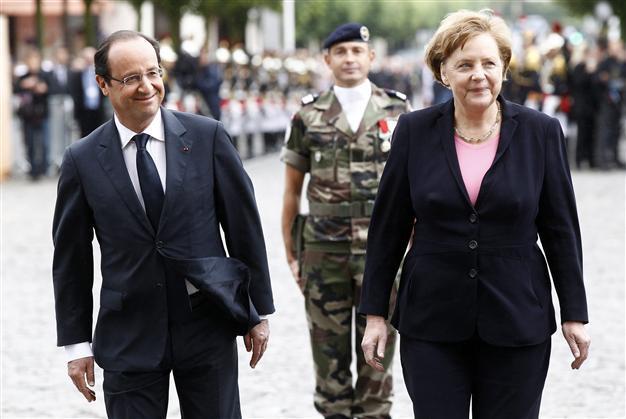France, Germany fete 50 years of post-war reconciliation
REIMS, France - Agence France-Presse

French President Hollande and German Chancellor Merkel at the 50th anniversary of the Franco-German reconciliation. EPA Photo
France and Germany marked 50 years of reconciliation today but the vandalism of German war graves cast a shadow as their leaders sought more unity to tackle the euro debt crisis.The desecration of the graves of 51 German soldiers killed during World War I came on the eve of the highly symbolic meeting in Reims in northern France, a region scarred from centuries of war with Germany.
French President Francois Hollande immediately launched into damage control telling German Chancellor Angela Merkel and others gathered in the cathedral at Rheims that "no obscure force and even less stupidity can alter the deep Franco-German friendship.
"Our friendship inspires Europe," he said. "We don't want to preach. We just want to give examples to be followed.
"Madam Chancellor, I propose from our side to open and even cross a new door together that will lead to even closer friendship between our two nations." The two leaders reviewed troops from their countries, exchanged kisses on the cheeks in greeting, and called each other "dear" Angela and Francois in stark contrast to earlier more formal, and even frosty, meetings.
The main event at Rheims cathedral, a UNESCO world heritage site extensively damaged by German bombing during World War I, was attended by a hundreds-strong cheering crowd.
Merkel's message was more direct.
"Europe is more than just a currency, and the Franco-German relationship is vital in this regard, it has deeply marked European unification," she said.
At the same time she stressed that others were welcome to join in, echoing Hollande who is seeking closer ties with Italy and Spain. "We must now put finishing touches on a political level of the economic and monetary union, it's a Herculean task but Europe is up to it," she said, ending her speech with "
"Long live Franco-German friendship" in both languages.
They also unveiled a plaque in German commemorating the "Mass for peace" before visiting an exhibition in the nearby Tau palace.
The post-war reconciliation, symbolically achieved in 1962 by then French president Charles de Gaulle and German chancellor Konrad Adenauer, was a milestone, Merkel said earlier.
The pair had shown "courage and foresight" and had swept aside the doubts of many, Merkel said, adding it was "an essential step on the road for a reunited Europe and that is why France and Germany work together." French Prime Minister Jean-Marc Ayrault, a Germanophile, recently said the relationship between Berlin and Paris "was a cornerstone in building Europe as history has given us a special responsibility." France and Germany, the eurozone's top economies, have worked closely in recent years as they scramble to solve the debt crisis hammering the single currency. Eurozone finance ministers will meet Monday in Brussels to build on measures agreed last month to tame the debt crisis.
Observers are watching to see how the relationship develops between the new French president, a centre-left advocate of growth, and Merkel, a centre-right defender of austerity.
The two have locked horns on resolving the crisis with Hollande advocating more spending to boost growth -- a position winning over more adherents in Europe -- while Merkel touts serious belt-tightening and more fiscal control.
On the eve of the watershed event, the graves of 51 World War I German soldiers were found desecrated at a military cemetery some 40 kilometres (25 miles) east of Reims.
A local prosecutor said the grave markers had probably been kicked out at the Saint-Etienne-a-Arnes cemetery, which contains the graves of some 12,000 World War I soldiers -- the majority of them German.
French Interior Minister Manuel Valls strongly condemned the vandalism saying: "An enquiry is under way and all means are being employed to find those responsible for this terrible desecration." According to initial information, the wooden crosses had been pulled up and some used for a camp fire. Several beer bottles were found nearby.
It was not immediately possible to say whether this was a "determined action" or just the work of "irresponsible people", a spokesman at the local prefecture said, adding there were no signs of any political message.
Reims was occupied by the Prussians in 1870, devastated by bombings during World War I, and was the city where on May 7, 1945, US general Dwight D. Eisenhower and the Allies received the unconditional surrender of the German Wehrmacht.
















